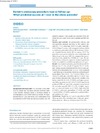Identificador persistente para citar o vincular este elemento:
https://accedacris.ulpgc.es/jspui/handle/10553/70779
| Título: | Tipo de procedimiento de endoscopia bariátrica o seguimiento: ¿Qué predijo el éxito al año en 962 pacientes obesos? | Otros títulos: | Bariatric endoscopy procedure type or follow-up: What predicted success at 1 year in 962 obese patients? | Autores/as: | Lopez-Nava, Gontrand Asokkumar, Ravishankar Rull, Angel Corbelle, Fernandez Beltran, Lucia Bautista Castaño, Inmaculada |
Clasificación UNESCO: | 32 Ciencias médicas 320503 Gastroenterología |
Fecha de publicación: | 2019 | Publicación seriada: | Endoscopy International Open | Resumen: | Background and study aims It is uncertain if the difference in weight loss outcomes between different endoscopic bariatric therapies (EBTs) is technique-related or multidisciplinary team (MDT) follow-up-related. We hypothesized that at 1 year, the weight loss is determined more by adherence to MDT follow-up than by procedure type. We aimed to compare 1 year weight loss outcomes of four different EBTs at a single center with a standardized MDT follow-up. Patients and methods We prospectively collected and retrospectively analyzed outcomes in 962 patients (female-691, 71.2 %; mean age, 44.8 ± 10.6 years, mean BMI, 37.8 ± 5.9 Kg/m 2 ) treated with Intragastric balloons (IGBs) or endoscopic gastroplasty (EG) at HM Sanchinarro University Hospital between March 2012 to January 2017. The procedures were performed by the same endoscopist and followed up by the same MDT. We compared the percentage total body weight loss (%TWBL) at 1 year. We performed linear and logistic regression to identify predictive factors for weight loss and follow-up adherence at 1 year. Results. Four hundred and eighty-one IGBs (Orbera-80.9 %; ReShape Duo-19.1 %), and 481 EG (Apollo ESG-51.3 %; Primary obesity surgery endoluminal-POSE-48.6 %) were performed. Only 480 patients (IGB- 45 %; EG- 55 %) completed 1 year follow-up. Among them, Apollo ESG achieved significantly higher TBWL (19.5 ± 13 %, P = 0.035), %TBWL (17.4 ± 10.2 %, P = 0.025), and ≥ 20 % TBWL (36.7 %, P = 0.032). However, in linear regression after adjusting for variables, only higher initial BMI (B = 0.31, P < 0.001) and higher percentage follow-up attendance (B = 0.24, P < 0.001) significantly predicted %TBWL at 1 year in the completion group but not the procedure type (B = 0.02, P = 0.72). In logistic regression, we observed female sex ( P = 0.01), high initial BMI ( P < 0.001), endoscopic gastroplasty ( P = 0.04), and high 1-month %TBWL ( P < 0.001) significantly predicted follow-up completion at 1 year. Conclusions Weight loss at 1 year is dependent on MDT follow-up rather than procedure type. Endoscopic gastroplasty promoted follow-up adherence more than IGBs. | URI: | https://accedacris.ulpgc.es/handle/10553/70779 | ISSN: | 2364-3722 | DOI: | 10.1055/a-1007-1769 | Fuente: | Endoscopy International Open [ISSN 2364-3722], v. 7 (12), p. E1691-E1698 |
| Colección: | Artículos |
Citas de WEB OF SCIENCETM
Citations
32
actualizado el 01-mar-2026
Visitas 10
307
actualizado el 15-ene-2026
Descargas
113
actualizado el 15-ene-2026
Google ScholarTM
Verifica
Altmetric
Comparte
Exporta metadatos
Los elementos en ULPGC accedaCRIS están protegidos por derechos de autor con todos los derechos reservados, a menos que se indique lo contrario.
